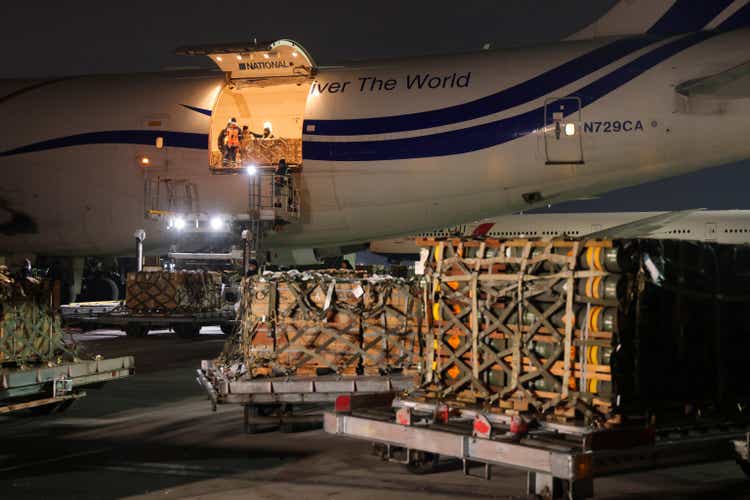Sean Gallup/Getty Images News
Bottlenecks in the world’s supply chains may prevent global arms sales from rising for a seventh straight year, despite higher demand after Russia’s invasion of Ukraine and greater tensions between China and Taiwan.
Sales of arms and military services by the world’s 100 biggest defense companies last year expanded 1.9% to $592 billion. The growth rate was lower than the 3.7% average for the four years before Covid-19 reached pandemic levels in 2020, according to the Stockholm International Peace Research Institute.
“We might have expected even greater growth in arms sales in 2021 without persistent supply-chain issues,” Lucie Béraud-Sudreau, director of the think tank’s military expenditure and arms production program, said in a statement. “Both larger and smaller arms companies said that their sales had been affected during the year.”
Sales among the biggest North American defense companies in 2021 slipped 0.9% from the prior year earlier, according to SIPRI’s analysis. The five biggest companies by arms sales are based in the United States: Lockheed Martin (NYSE:LMT), Raytheon Technologies (NYSE:RTX), Boeing (NYSE:BA), Northrop Grumman (NYSE:NOC) and General Dynamics (NYSE:GD).
The slowdown preceded Russia’s invasion of Ukraine, whose allies have provided billions of dollars in arms to the country. Replacing those stocks won’t happen overnight, especially with the challenges of worker shortages and obtaining parts from suppliers.
“Increasing arms-production output takes time and it could be several years before arms companies are able to adjust to the new demand created by the war in Ukraine,” SIPRI said in its report.
It cited Javelin anti-tank missiles, which are made by a joint venture between Lockheed Martin (LMT) and Raytheon (RTX), as an example of the challenges. As of October, the United States had supplied Ukraine with 8,500 Javelins from its war reserves – the equivalent of at least four of production. The companies plan to almost double output from 2,100 missiles a year to 4,000 a year, but ramping up production will take a couple of years.
It also may take just as long for U.S. defense companies to see revenue from any contracts they sign today. Raytheon (RTX) has received expedited contracts for missile systems from the U.S. defense department, and awaits contracts from European countries such as Germany.
“We’re seeing the demand. We’re not seeing all the contracts yet,” Greg Hayes, CEO of Raytheon, said Wednesday in an interview with business news channel CNBC at the Reagan National Defense Forum. “Given the lead times that we see today, we probably won’t see a significant uptick in revenue, I would say, for at least two years.”
| Company | Country | Arms sales, 2021 (millions) | % change from 2020 |
| Lockheed Martin (LMT) | USA | $60,340 | -0.6% |
| Raytheon Technologies (RTX) | USA | $41,850 | 9.1% |
| Boeing (BA) | USA | $33,420 | -2.1% |
| Northrop Grumman (NOC) | USA | $29,880 | -5.8% |
| General Dynamics (GD) | USA | $26,390 | -2.1% |
| BAE Systems (OTCPK:BAESY) | UK | $26,020 | -1.0% |
| NORINCO* | China | $21,570 | 11.0% |
| AVIC* | China | $20,110 | 9.0% |
| CASC* | China | $19,100 | 4.2% |
| CETC* | China | $14,990 | -5.6% |
| *The arms sales figure for this company is an estimate with a high degree of uncertainty | |||
| Source: SIPRI | |||
Image and article originally from seekingalpha.com. Read the original article here.

